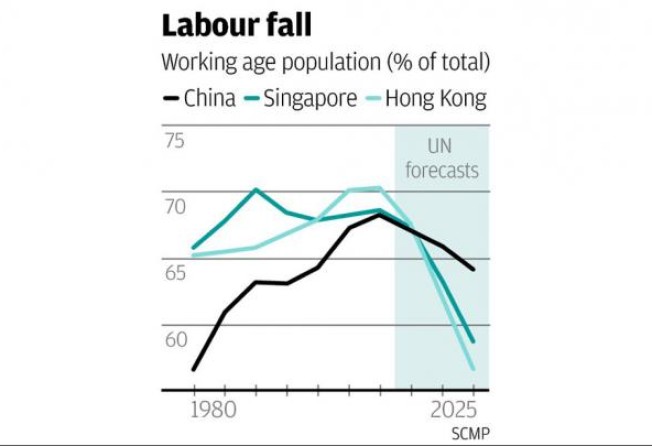If demography is destiny, HK's home prices foretell an evil fate
The city's high land prices and property cartels must come to an end because only then can an expanding population raise productivity

Demography, it is often said, is destiny.
Demographic trends have certainly played a major role in driving Asia's economic growth over recent decades.
Cleaner water supplies and the provision of basic healthcare meant far more babies survived to reach adulthood. At the same time, better schooling meant more children - and many more girls - received an education.
The result a few years down the line was a much bigger and more productive workforce.
Bigger workforces boosted economic output in their own right. But there was also a powerful multiplier effect.
Better educated and richer families tend to have fewer babies. As a result women spent less time looking after their children and more time working.
What's more, with fewer children to care for, families could afford to save more, helping to fund the infrastructure investment the region needed so badly to raise productivity to the next level.
The result was an explosion in Asia's economic growth. According to the Asian Development Bank, during the 1980s demographic factors alone added 2.5 percentage points to Thailand's annual per capita growth rate, and around 2 percentage points to China's and South Korea's.
But the trend cannot last. With people who entered the labour force in the '70s now nearing retirement age, the UN population division warns that in Hong Kong, Singapore, Korea and China the number of workers will soon begin to fall relative to their dependents (see chart).
To some economists, that decline spells disaster. Among them is Nobel laureate Edmund Phelps, who in 2007 warned that: "Demographics are a negative force that will weigh very heavily on China."
The pessimists fear the burden of supporting armies of retirees, many without adequate pensions, will depress savings rates and crush economic growth.
Not everyone is so worried. Gareth Leather at independent research house Capital Economics points out that there is plenty Asian governments can do to counter the effects of adverse demographic headwinds.
Most obviously they can raise their retirement age, as Germany has recently done, and provide incentives to people who keep on working. That could make an especially big difference in China where the official retirement age is just 60 for men and a relatively youthful 55 for women.
China will also benefit from continued migration into its cities from the countryside. With more than 35 per cent of the workforce employed in agriculture, compared with less than 10 per cent in Korea, there are many productivity gains still to be made from rural-urban population movement.
Governments could also encourage more women to work. Even in cosmopolitan Hong Kong, the female labour force participation rate is a lowly 50 per cent according to World Bank figures, modest compared to rates of 60 per cent in Europe.
Then there is immigration. Hong Kong's government has long counted on net immigration at a rate of around 30,000 a year to maintain the city's work force.
That might not sound like a lot for a territory with a population of 7 million. But compared with an average rate over the last five years of less than 2,000 a year it would be a massive increase.
Given that feelings are already running high over the number of mainlanders visiting, and giving birth in, the city, it is perhaps not surprising that the government has recently begun to scale back its immigration targets.
Singapore too, has found that immigration causes tensions. After a rapid immigrant-driven increase in population led to a political backlash among locals, Singapore has slowed the influx, making it more difficult to hire foreign workers.
That leaves just the traditional way to increase the size of the future labour force.
Worried by one of the lowest fertility rates in the world, Singapore's government has long tried to rouse its citizens to procreate more.
Hong Kong's fertility rate is even lower. Yet any official campaign to encourage people to have more babies is likely to fail dismally.
The reason is simple. While many local families would like to have a second, or even a first, baby, sky-high property prices mean they cannot afford to move to a home large enough to accommodate another family member.
So if Hong Kong's government really wants to put in place a workable population plan, it will first have to abandon its high land price policy and break up the cartel which controls our property market.
Only by a radical overhaul of the property market's structure can the government hope make family homes more affordable over the long term, so raising Hong Kong's fertility rate and averting the city's looming date with demographic destiny.